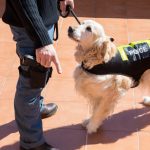Drug Dogs Are No Deterrent & Increase the Harm: An Interview With RMIT’s Dr Peta Malins

These days, commuters alighting the train of an early evening at Sydney’s Central station can be confronted by police with drug dogs. And if a canine makes an indication about one of the citizens on the platform, that individual can end up behind a screen being strip searched.
Young people attending festivals have to factor into their evening that they’re likely to come across a drug detection dog operation at the entrance to an event. And considering dogs get it wrong two-thirds to three-quarters of the time, they might be indicated regardless of what’s in their possession.
Following a pooch singling them out, a teenager can be taken into a small tent by uniformed and armed officers, and then be ordered to take all of their clothes off. And if nothing is found, the officers still have the discretion to take their ticket and bar them from the festival.
Sometimes it’s easy to forget that it didn’t used to be this way. Prior to the lead up to the 2000 Olympics, police didn’t harass the public with drug dogs. Festivalgoers in the 1990s weren’t living in a police state. And this last decade has seen a massive ramping up of drug dogs and strip searches.
Increasing the harms
But, people adapt. Nowadays, young people get together and dangerously drop all of the drugs they would have normally taken over the course of a festival at once prior to arrival. It’s called preloading. And it’s just one of the ways that punters have found they can have their drugs and gain entry too.
James Munro was only 23 years old when he spotted police with dogs at the front of the 2013 Defqon festival. To avoid getting arrested he downed several pills at once, and half an hour after gaining entry, he collapsed, fell into a coma, his organs failed, and he never regained consciousness.
Last music festival season in NSW, the drug-related death toll was steep. Five young Australians died when they were just out for a good night. Their drugs were either too toxic or too strong. They weren’t to know. They had no way of telling.
In European nations, like the Netherlands, the authorities allow people to test their drugs to see if they could be lethal. In NSW, the authorities take the “just say no” approach, which translates to “you buy illegal drugs, well, it’s your own fault if it happens”.
A flawed drug war tactic
RMIT criminology and justice studies lecturer Dr Peta Malins recently released her paper Drug Dog Affects, in which she documents the deleterious impact drug dog operations are having on the social and emotional well-being of communities around the country.
Sydney Criminal Lawyers spoke to Dr Malins about some of the problematic assumptions behind deploying deterrence-focused sniffer dogs, the traumatic effects that an accompanying strip search can have, and the damage these operations are causing to police-community relations.
Firstly, the police use of sniffer dogs is predicated on the proposition that they deter drug use. Your study involved interviewing 22 participants who’d previously been subjected to a search.
Dr Malins, broadly speaking, what sort of a deterrent effect did you find drug dogs have on illicit substance use?
My research found that there was no real deterrent effect of the drug detection dogs on drug use at all.
No one that I spoke to was actually stopping or reducing their drug use in response to the drug detection dogs, instead people were just changing the way in which they were using or carrying drugs.
In your study, you pointed out that in asserting that sniffer dog operations do deter people from taking drugs, police are making some wrong assumptions. Can you elaborate on what they are?
The notion of deterrence assumes that people can and will make rational choices about risks – such as getting caught and punishment – outside of other considerations and influences.
They also assume that the risk of getting caught is going to outweigh any of the possible benefits or pleasures of people’s drug use. Those pleasures and benefits tend to be massively underestimated by policing authorities.
And they also make the assumption that the only rational way to avoid the risk of getting caught by police is to not use drugs, when, in fact, the people in my study showed that they do actually engage in a whole range of clever and rational ways of avoiding the dogs and still manage to use their drugs.
As you’ve just mentioned, your study notes that the presence drug dogs at festivals encourages dangerous drug-taking behaviours to avoid detection.
How common are these risky behaviours? And what are some of the harms the use of these dogs is causing?
These risky behaviours are quite common. While some people do just decide to carry on as usual and carry their drugs in normally and hope for the best, there are quite a lot of people who are making a substantial effort to try to find ways to avoid being detected by drug dogs.
The key ways people told me about were that they’re preloading drugs: taking them in higher quantities than they otherwise would before turning up to an event. Sometimes that involved some people panicking and preloading right then and there, when they saw the dogs.
Other people talked about trying to get past the dogs by stashing their drugs internally in vaginal and anal cavities, or sometimes in their mouth. This carries its own risks.
And others talked about waiting and buying drugs inside events. None of them ever talked about having any trouble in doing that. But, of course, that means buying from unknown suppliers, with less quality control processes going on.
So, all of those kinds of adaptations that people talked about actually increase the risks of overdose and other health harms.
Were these behaviours a result of having been searched in the past?
They were either the result of having personally encountered the dogs in the past – not necessarily being stopped by police – but having the experience of the drug dogs being there, or being aware that the drug dogs were likely to be there.
Some of the people I spoke to did talk about the time that they came across the dogs whilst carrying drugs. In those cases, they talked about panic ingestion of more pills faster.
You also looked into the type of trauma that these searches can result in. In the case of a person being indicated by a sniffer dog and then being subjected to an ordinary search, what sort of an impact can this have?
People who were stopped by a drug dog operation and searched talked about their feelings of fear and anxiety. And a lot of bodily effects associated with that: increased heart rate and shaking, that sort of embodied trauma.
They talked about the sense of disempowerment that they felt in those encounters. That had to do partly with the way that they felt they had no power in the situation, but sometimes also the way that police spoke to them.
They also talked about the public sense of humiliation and stigma that came with being stopped and searched in front of other people. There was the stress that came along with that, and also frustration and anger associated with it.
The humiliation, stigma, frustration and anger were particularly notable for people who already felt themselves to be part of marginalised communities, but it was felt by all of the people I spoke to.
Did your research take into account whether marginalised people are being targeted by drug dog searches?
It wasn’t something I looked at in this study. But, certainly, I’ve looked at research that has already shown that drug detection dog operations do tend to disproportionately affect marginalised communities.
They’re more often deployed in locations where there are higher marginalised populations.
And as part of my research, which is going to be published in another paper, I’m also looking at the ways in which the drug dogs are disproportionately deployed towards people who look a particular kind of way.
Last year, in NSW, around 11 percent of people indicated by sniffer dogs ended up being strip searched. The use of this invasive technique by NSW police has skyrocketed over recent years.
What sort of ongoing effect did you find strip searches can have on those who are subjected to them?
The people I spoke to talked about the intense trauma associated with strip searches, compared to being stopped and searched in public, which had its own trauma. Strip search experiences were particularly traumatic, disempowering and dehumanising.
One of my participants, for example, talked about it feeling like they were a prisoner.
The trauma associated with any of these searches, but particularly strip searches, can be long-lasting, so not only affecting people for the rest of that day, but also into the future.
One participant I spoke to had a history of trauma and assault previously. She experienced the strip search as particularly traumatising and it affected her in many ways going into the future. It had a huge impact on her life.
Those kinds of situations where people, particularly women, have experienced trauma in the past is not being taken into account when police are deploying these types of strip searches in such a widespread way across the community.
Critics of drug dogs raise concerns around civil liberties and legal ambiguities. Your study didn’t delve into these areas, but during your research what did you come across in regard to these issues?
A lot of questions have been raised about whether a positive drug dog indication can indeed be used to justify the reasonable suspicion necessary for a warrantless search of somebody, given the fact that police only end up finding illicit drugs about one-quarter of the time after a positive indication.
So, a lot of questions have been raised about whether that can justify a search. And the courts are yet to actually test this proposition.
It is interesting though, that it seems policing agencies have already started to acknowledge this legal ambiguity by suggesting to their officers that it can be used as only part of the justification for reasonable suspicion.
This sort of suggests that they already realise that a positive drug dog indication is not enough necessarily to legally justify a search.
It will be interesting if the courts do test it one day.
And what sort of an effect is this highly flawed technique having upon the relationship between the police and the public? And what are the implications of this?
A lot of people are already aware of the fact that it is flawed and that this has been identified. This seems to be leading to a lack of trust and legitimation for police.
For example, a lot of people didn’t know this before being searched. But, after that they went and did some research and discovered the problems.
Of course, the personal experiences that people are having of being stopped, searched and traumatised as part of these operations is also reducing trust in police. And it’s producing a lot of anger.
All of those things together are really reducing police-community relations, particularly for young people going to events and festivals, as well as marginalised communities.
And these impacts on police-community relations will have a long-term effect and reduce people’s willingness to assist police in other sorts of matters.
It can also have health impacts on people who don’t trust the police and therefore, when they run into trouble, they’re less likely to go to police.
This can also lead to people being less likely to go to health services for support for fear that police might be there.
And lastly, Dr Malins, given that these operations don’t work as a deterrent, but do increase the risk of drug harms and traumatise the community, you recommend that they be stopped immediately. What would you suggest as an alternative?
There are two things. If police do feel the need to be at festivals and events – or at train stations – then they should be there to help people and to keep people safe as their main aim, rather than be there to try to catch and punish people, or as some sort of deterrent effect.
The focus should be on helping people and keeping people safe.
And instead of putting all this money and resources into drug dog operations – which are reducing trust and creating lots of harms – those resources should go into evidence-based programs, like pill testing and peer education and support programs, like DanceWize that runs in Victoria and NSW.






